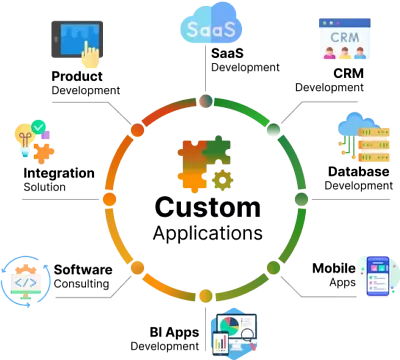Building Scalable Software Solutions for Rapidly Growing Startups

In the high-stakes world of startups, where innovation meets speed, having scalable software solutions is not just a luxury—it’s a necessity. As a startup grows, so do its technical demands, user base, and performance expectations. Without scalable infrastructure and software architecture, even the most promising ventures can hit performance bottlenecks that hinder growth.
What is Scalable Software?
- Horizontal scalability: Adding more machines to handle more load
- Vertical scalability: Upgrading current hardware for better performance
- Modular architecture: Building flexible components that can evolve independently
Why Scalability is Critical for Startups
Here are key reasons startups must prioritize scalable software:
1. Adapt to Market Demands
Startups often pivot, test new features, and enter new markets. A scalable architecture allows for quick iterations and agile responses.
2. Prevent Technical Debt
3. Investor Confidence
Scalable infrastructure shows that a startup is technically mature and ready for rapid growth—a trait that appeals to investors.
4. Improve User Experience
As user numbers grow, performance must remain consistent. Scalable solutions help ensure fast loading times and minimal downtime.
Core Elements of Scalable Software Solutions
Building scalable software requires strategic planning, robust architecture, and experienced development teams. Here’s what to focus on:
1. Cloud-Native Architecture
- Leverage platforms like AWS, Google Cloud, or Azure
- Use containers (Docker, Kubernetes) for flexible deployment
- Automatically scale resources during peak loads
2. Microservices and APIs
- Break down monolithic apps into smaller, independent services
- Enable parallel development and easier updates
- Foster system resilience and faster troubleshooting
3. Database Scalability
- Use NoSQL or hybrid databases where appropriate
- Implement sharding, replication, and indexing
- Ensure data integrity during growth phases
4. Load Balancing and Caching
- Distribute traffic across multiple servers
- Cache frequently accessed data to speed up response times
5. CI/CD and DevOps
- Automate testing, integration, and deployment
- Enable faster releases and rollback capabilities
Choosing the Right Development Partner
One of the most critical decisions for a startup is selecting the right development partner. The best Software Development Companies for Startups bring not just technical skills, but also strategic insight.
What to Look For:
- Experience with startups: Have they helped other startups grow?
- Flexible engagement models: Do they offer MVP development, dedicated teams, and scaling options?
- Agile methodology: Can they pivot quickly as your product evolves?
- End-to-end services: Strategy, design, development, testing, and support
- Technology stack diversity: Can they recommend the right tech for your needs?
Partnering with a custom software application development company ensures that your software is purpose-built, rather than relying on generic solutions that may not scale.
Benefits of Custom Software Development Solutions
Advantages:
- Tailored to business needs: Build only what you need
- Scalable architecture from day one
- Integration with existing tools and platforms
- Higher security control
- Ownership of intellectual property
These benefits become even more valuable as your startup scales. A trusted custom software development company will understand your growth trajectory and build solutions that evolve with your needs.
Real-World Use Cases
1. Fintech Startups
2. SaaS Startups
Scalable backend infrastructure and feature-rich frontend design are key. CI/CD pipelines and modular services help them roll out updates without downtime.
3. Healthcare Tech
4. E-commerce Platforms
Need to handle massive traffic spikes during campaigns. Load balancing, caching, and flexible cloud architecture are vital.
Scaling Strategy: From MVP to Enterprise
Every startup begins with a Minimum Viable Product (MVP), but the goal is to evolve into a fully featured, enterprise-grade platform. Here’s how:
Phase 1: MVP Development
- Focus on core functionality
- Validate market demand
- Partner with a custom software application development company for rapid prototyping
Phase 2: User Acquisition & Feature Expansion
- Add user-requested features
- Optimize performance and UX
- Begin modularization for scalability
Phase 3: Growth & Infrastructure Scaling
- Migrate to scalable cloud infrastructure
- Implement advanced analytics and monitoring
- Harden security and compliance
Phase 4: Enterprise Readiness
- Full DevOps implementation
- Load testing and disaster recovery planning
- Multi-region deployment support
Future-Proofing Your Startup with Custom Solutions
- Recommending scalable technologies
- Building APIs for integration with emerging tools
- Offering scalable UI/UX designs
- Providing long-term support and upgrades
Leveraging Emerging Technologies for Enhanced Scalability
1. AI and Machine Learning Integration
- Example: An AI-powered recommendation engine for an e-commerce startup can scale with product inventory and user data without manual tuning.
2. Serverless Computing
- Benefit: Reduced operational costs and effortless scalability for event-driven applications.
3. Blockchain for Data Integrity
- Use Case: A logistics startup can use blockchain to track shipments with tamper-proof records that scale as operations grow.
Common Scalability Pitfalls Startups Should Avoid
As startups scale, they often face challenges that hinder performance or delay product development. Here are some common pitfalls and how to mitigate them:
1. Overengineering Too Early
While planning for scalability is essential, overengineering features or infrastructure in the early stages can waste valuable resources. Focus on the MVP, then scale as user needs become clearer.
2. Ignoring User Feedback
Failing to incorporate real user feedback during development can lead to scalability in the wrong direction. Use agile methodologies to iterate based on real-world usage.
3. Lack of Monitoring and Analytics
Without performance monitoring and usage analytics, it’s difficult to know when or where to scale. Implement tools like Prometheus, Grafana, or Datadog early in the development process.
4. Inflexible Architecture
Rigid monolithic applications can be hard to scale. Prioritize loosely coupled microservices or service-oriented architecture from the beginning.
Partnering with experienced Software Development Companies for Startups can help navigate these pitfalls, ensuring strategic scaling aligned with business growth.
Building a Global Engineering Team
Advantages of Global Teams:
- 24/7 development cycles with distributed teams
- Access to niche skills not available locally
- Flexible engagement models (dedicated teams, time-and-materials, or hybrid)
Final Thoughts
In the world of startups, growth is both an opportunity and a challenge. Software must be more than functional—it must be resilient, adaptable, and scalable. Investing in the right software architecture and development partner early on can mean the difference between exponential growth and operational chaos.
Collaborating with top-tier Software Development Companies for Startups gives you access to the technical expertise, strategic thinking, and agile methodologies needed to thrive. Whether you’re launching an MVP or preparing to go enterprise-level, the support of a custom software development company ensures that your infrastructure scales with you.
By prioritizing Custom Software Development Solutions, startups can build technology that not only meets today’s needs but also paves the way for long-term success. The key is finding a custom software application development company that aligns with your vision, understands your market, and delivers robust, scalable software tailored to your growth.
Ready to future-proof your startup with scalable, custom-built software? Partner with expert developers who understand your growth journey—let’s build for scale, together.



